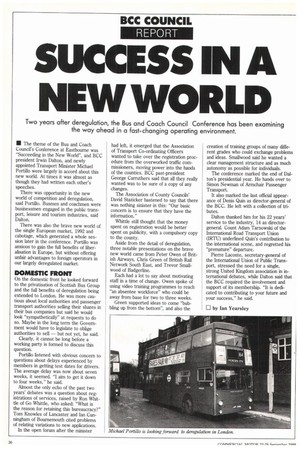SUCCESS IN A NEW WORLD
Page 20

If you've noticed an error in this article please click here to report it so we can fix it.
Two years after deregulation, the Bus and Coach Council Conference has been examining the way ahead in a fast-changing operating environment.
• The theme of the Bus and Coach Council's Conference at Eastbourne was "Succeeding in the New World", and BCC president Irwin Dalton, and newly appointed Transport Minister Michael Portillo were largely in accord about this new world. At times it was almost as though they had written each other's speeches.
There was opportunity in the new world of competition and deregulation, said Portillo. Busmen and coachmen were businessmen engaged in the public transport, leisure and tourism industries, said Dalton.
There was also the brave new world of the single European market, 1992 and cabotage, which generated a whole session later in the conference. Portillo was anxious to gain the full benefits of liberalisation in Europe, but without offering unfair advantages to foreign operators in our largely deregulated market.
DOMESTIC FRONT
On the domestic front he looked forward to the privatisation of Scottish Bus Group and the full benefits of deregulation being extended to London. He was more cautious about local authorities and passenger transport authorities selling their shares in their bus companies but said he would look "sympathetically" at requests to do so. Maybe in the long term the Government would have to legislate to oblige authorities to sell — but not yet, he said.
Clearly, it cannot be long before a working party is formed to discuss this question.
Portillo listened with obvious concern to questions about delays experienced by members in getting test dates for drivers. The average delay was now about seven weeks, it seemed. "I aim to get it down to four weeks," he said.
Almost the only echo of the past two years' debates was a question about registrations of services, raised by Ron Whittle of Go Whittle, who asked: "What is the reason for retaining this bureaucracy?" Tom Knowles of Lancaster and Ian Cunningham of Bournemouth cited problems of relating variations to new applications.
In the open forum after the minister had left, it emerged that the Association of Transport Co-ordinating Officers wanted to take over the registration procedure from the overworked traffic commissioners, moving power into the hands of the counties. BCC past-president George Carruthers said that all they really wanted was to be sure of a copy of any changes.
The Association of County Councils' David Stazicker hastened to say that there was nothing sinister in this: "Our basic concern is to ensure that they have the information."
Whittle still thought that the money spent on registration would be better spent on publicity, with a compulsory copy to the county.
Aside from the detail of deregulation, three notable presentations on the brave new world came from Peter Owen of British Airways, Chris Green of British Rail Network South East, and Trevor Smallwood of Badgerline.
Each had a lot to say about motivating staff in a time of change. Owen spoke of using video training programmes to reach "an absentee workforce" who could be away from base for two to three weeks.
Green supported ideas to come "bubbling up from the bottom", and also the creation of training groups of many different grades who could exchange problems and ideas. Smallwood said he wanted a clear management structure and as much autonomy as possible for individuals.
The conference marked the end of Dalton's presidential year. He hands over to Simon Newman of Armchair Passenger Transport.
It also marked the last official appearance of Denis Quin as director-general of the BCC. He left with a collection of tributes.
Dalton thanked him for his 22 years' service to the industry, 14 as directorgeneral. Count Adam Tamowski of the International Road Transport Union (IRTU) underlined Quin's contribution to the international scene, and regretted his "premature" departure.
Pierre Laconte, secretary-general of the International Union of Public Transport, stressed the need for a single, strong United Kingdom association in international debates, while Dalton said that the BCC required the involvement and support of its membership. "It is dedicated to contributing to your future and your success," he said.
by Ian Yearsley










































































